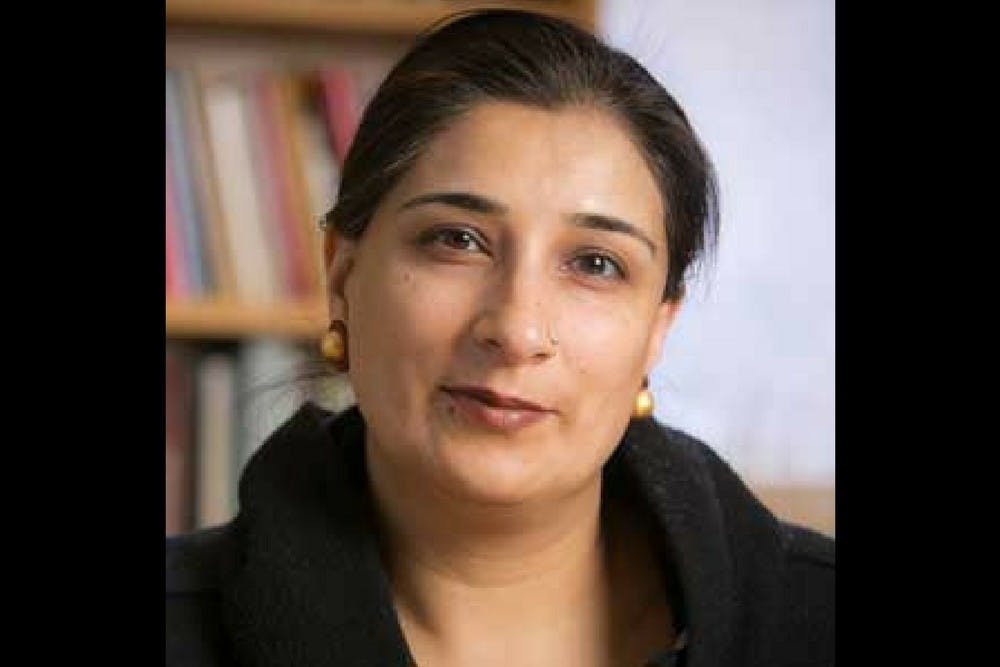Ranjana Khanna, professor of English, women's studies and literature, has been appointed the next director of the Franklin Humanities Institute at Duke starting January 2018. The Chronicle spoke with Khanna about her past and future involvement with FHI, which encourages and promotes humanistic inquiry. This interview has been edited for length and clarity.
The Chronicle: What is FHI’s role in the Duke community?
Ranjana Khanna: The institute is a space for thinking humanistically across disciplines with a vision informed by international scholarship. It has aimed to investigate what constitutes humanistic thought in the twenty-first century.
The Humanities Labs are the primary way that undergraduates can have a solid foothold within the institute. These labs follow particular themes, integrating faculty interest with that of undergraduate and graduate students and continue for around three years. They are usually collaborations across departments and allow undergraduates to work in faculty research models that are interdisciplinary and couldn’t be done in just one specific department, and allow students at all levels to be involved in cutting edge research.
TC: How do you plan to develop the Institute?
RK: I aim to streamline a vision for the big changes and expansion it has undergone. I have a great deal of respect for those who have held this position before me, and I see no real need to depart from many of the good ideas that have been put in place. We will be having some postdoctoral scholars working in the program. With deference to the legacy of John Hope Franklin, we’ll be thinking too about such issues as race, historiography, law, the teaching of history in schools in the US and an understanding of global historical relations.
I also plan to develop the relationship between the arts and the humanities, so that students understand what may come of collaboration in other fields and of interdisciplinary thought. The core areas to explore are: how to consolidate a global approach of the humanities in the changing world, how to maintain a public humanities effort and consolidating ideas concerning a changing world.
TC: What kind of research have you been involved in? How do you plan to continue and advance that as director of FHI?
RK: My interest has always been very interdisciplinary and I’ve worked on a number of different areas in the past. My research and my teaching have focused largely on feminist, postcolonial and psychoanalytic studies. My first big project was on psychoanalysis and colonialism, and I continue to be very interested in the way in which psychoanalysis does and does not assume a certain culturally-specific model of the ego.
I have also explored Algerian postcolonial studies—specifically Franco-Algerian thought around the “figure of woman”. It was a nation very interesting to me because it had established itself as an “avant-garde” third-world nation that wasn’t going to fall into various problems that some other newly-independent nations had, but it did in fact end up facing those problems. Most recently, I have worked on the topic of mental and political asylum and on the “art of unbelonging." These research projects will be off my desk before I start directing in January.
Who knows what the future holds? I would like to go back and work on some aspect of international psychoanalysis.
TC: Before you were appointed the director of the Franklin Humanities Institute, what was your role with the institute?
RK: I have been here at Duke for quite a long time—since 2000. I came in as an assistant professor in the English department, and was soon appointed in the Literature Program and in Women’s Studies—now Gender, Sexuality, and Feminist Studies. FHI had just started up. As it opened its doors in the John Hope Franklin Center, where it was situated for many years, I was there almost every day for an event or a talk. I’ve always been very interested in interdisciplinary scholarship, which is what goes on at FHI, so I greatly appreciated the inclusion of an interdisciplinary perspective. I’ve been both personally and professionally attached to the FHI, because my late partner was the director at one point. A long while back, I was a faculty fellow, when the annual theme was indigeneity and diaspora. I have been on the board for the past year.
TC: What has been your involvement at Duke?
RK: I was [director of undergraduate studies] in the English department for a long time and also directed the Women’s Studies Program from 2007 to 2015. One of the things that I did in the women’s studies department, which was partly inspired by the early years at the FHI, was to have themed years. We would follow an annual theme, which would align with faculty research. There would be events organized around speakers, research projects and conferences, and I enjoyed running those events very much and working with people to create conversations around their research topics. I would like to bring these themed years back to FHI, because I think it worked well for coordinating and streamlining visiting speakers, faculty research and graduate and undergraduate teaching.
Get The Chronicle straight to your inbox
Signup for our weekly newsletter. Cancel at any time.

